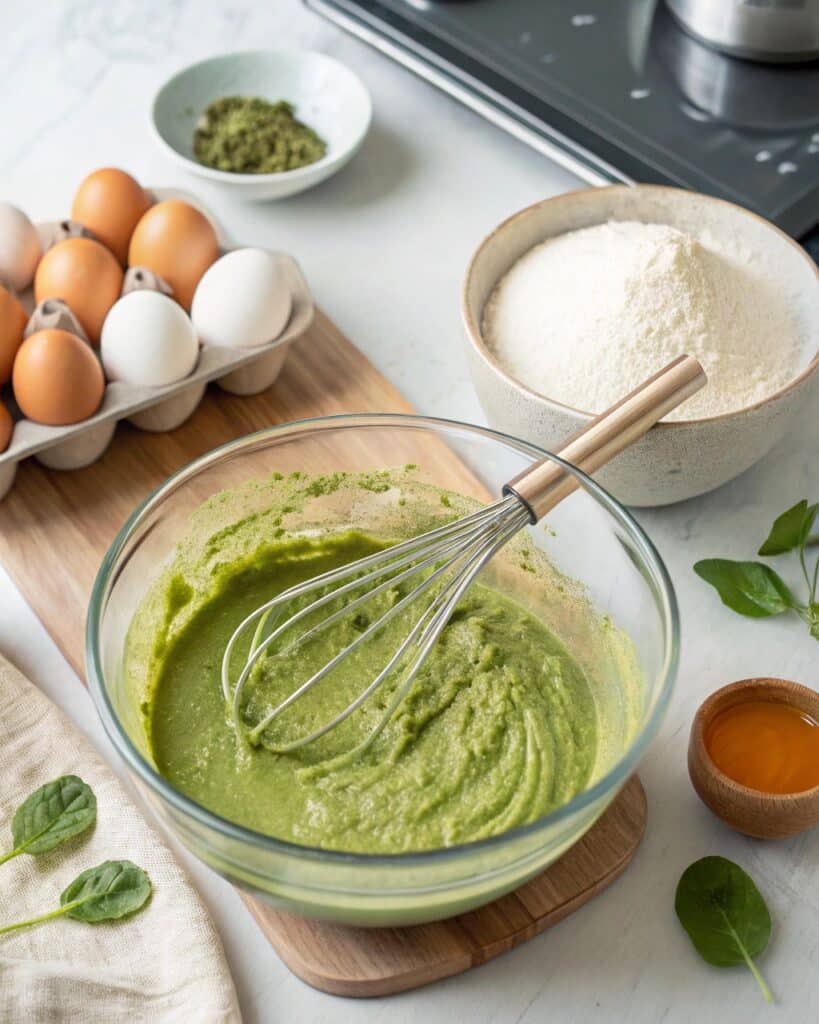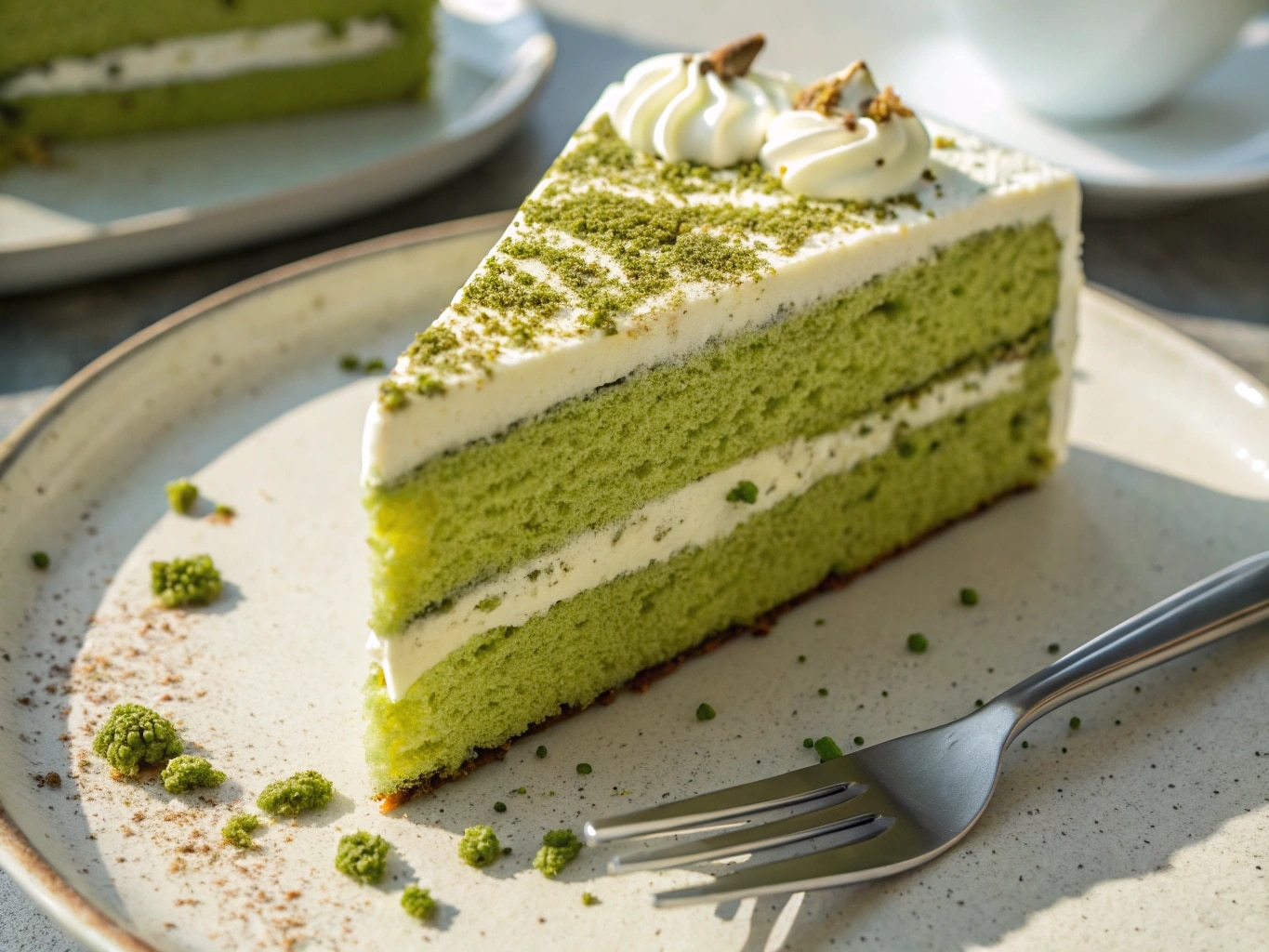Looking for a dessert that’s vibrant, fluffy, and full of earthy flavor? This matcha cake recipe brings the antioxidant-rich goodness of green tea into a soft sponge layered with creamy frosting. Matcha cake has become a favorite in bakeries, tea rooms, and home kitchens across the U.S., and now you can bake it from scratch. In this guide, you’ll discover what makes matcha cake unique, step-by-step instructions for the perfect sponge, expert baking tips, and popular variations like matcha chiffon cake. Plus, we’ll answer the most common questions people ask about green tea cakes so you can master this trendy dessert with confidence.
Looking for inspiration? Try our delicious twist on classic plant-based options like this vegan vanilla cake.

Matcha Cake
Equipment
Ingredients
- 1 cup all-purpose flour
- 1 tbsp matcha powder
- ½ tsp baking powder
- ¼ tsp salt
- ¾ cup granulated sugar
- 2 large eggs
- ½ cup vegetable oil
- ½ cup milk
- 1 tsp vanilla extract
Instructions
- Preheat oven to 175°C (350°F). Grease and line a cake pan.
- In a bowl, whisk together flour, matcha powder, baking powder, and salt.
- In another bowl, beat the eggs and sugar until light and fluffy.
- Add oil, milk, and vanilla extract to the egg mixture and mix well.
- Gradually fold in the dry ingredients until just combined.
- Pour the batter into the prepared pan and smooth the top.
- Bake for 25–30 minutes or until a toothpick inserted comes out clean.
- Let cool before serving. Optionally dust with powdered sugar or matcha.
Notes
Nutrition
Table of Contents
Table of Contents
What Is Matcha Cake and Why Is It So Popular?
What is matcha cake made of?
At its core, is a fusion of Japanese tradition and Western-style baking. It’s made using matcha powder, a finely ground, vibrant green tea powder sourced from shade-grown tea leaves. When used in cakes, matcha delivers a naturally green color and a distinctive, slightly bitter flavor that balances perfectly with sweet ingredients like sugar, vanilla, and butter.
Common ingredients in matcha cake include:
- All-purpose flour or cake flour
- Baking powder or baking soda
- Eggs
- Sugar
- Milk (or plant-based alternatives)
- Oil or butter
- Matcha powder (culinary grade)
The origins and cultural significance of green tea cake
Matcha has deep roots in Japanese tea ceremonies, where it’s prized for its meditative and energizing qualities. Over time, it has crossed cultural boundaries and found its place in Western desserts, including ice cream, cookies, lattes, and of course — cake. The idea of turning matcha into a cake isn’t just trendy; it’s an elegant nod to Japan’s culinary influence, combined with the creativity of modern baking.
Green tea cakes first gained popularity in Asia, especially in Japan and Korea. As matcha made its way to the U.S., bakeries began offering variations such as:
- Matcha roll cakes
- Matcha sponge cakes
- Matcha birthday cakes
- Matcha chiffon cakes, known for their lightness
This blend of tradition and novelty is a big part of why matcha cakes have become social media darlings. Their photogenic green color and earthy taste set them apart in a dessert world dominated by chocolate and vanilla.
Health Benefits of Matcha in Baking
Why matcha is a superfood ingredient
One reason why green tea cake has surged in popularity is the healthy reputation of matcha. Unlike traditional tea bags, matcha powder is made by grinding whole green tea leaves, which means you’re consuming the entire leaf — and with it, all its antioxidants and nutrients.
Here’s what makes matcha a true superfood:
- Rich in EGCG (Epigallocatechin gallate): A powerful antioxidant known for fighting inflammation and aiding in weight management
- Natural caffeine + L-theanine: This combo delivers steady energy and focus without the jitters
- Boosts metabolism: Some studies suggest matcha helps enhance fat oxidation
- Supports heart and brain health: With regular consumption, matcha may improve cholesterol levels and cognitive function
That means when you enjoy a slice of matcha cakes, you’re not just indulging — you’re benefiting from natural, plant-based nutrition.
Nutritional advantages of adding matcha to cakes
Though a cake is still a treat, adding matcha does upgrade its nutritional value compared to traditional cake flavors. Even small amounts of matcha powder can introduce:
- Fiber
- Chlorophyll
- Polyphenols
- Essential vitamins like A, C, E, K, and B-complex
This makes matcha baking especially appealing for health-conscious dessert lovers. It’s no wonder recipes for vegan green tea cakes and gluten-free matcha chiffon cakes are trending across wellness blogs and baking communities.
Discover great ideas like this vegan carrot cake recipe to explore other nutrient-dense desserts.
Ingredients for Matcha Cake
Essential ingredients
A successful matcha cake recipe begins with high-quality ingredients. While similar to a standard sponge or chiffon cake, matcha cake includes a few unique touches that set it apart. Here’s a quick overview of the essentials you’ll need:
| Ingredient | Purpose |
|---|---|
| All-purpose or cake flour | Creates structure and softness |
| Baking powder/soda | Adds lift and airiness to the batter |
| Granulated sugar | Balances matcha’s earthy bitterness |
| Eggs | Binds and leavens; crucial for volume |
| Oil or melted butter | Adds richness and moisture |
| Milk or dairy-free milk | Thins the batter and smoothens texture |
| Vanilla extract | Enhances overall flavor profile |
| Matcha powder | The star of the show: color, taste, and health |
When shopping for matcha, choose culinary-grade matcha powder. It’s less expensive than ceremonial grade and specifically made for baking.

💡Pro Tip: Sift your matcha powder before mixing it in. This avoids clumps and ensures smooth, even flavor.
Ingredient substitutions and dietary-friendly swaps
Matcha cake is incredibly flexible and can be easily adapted for various diets:
- For vegan matcha cake: Swap eggs with applesauce, flax eggs, or aquafaba. Use plant-based milk like oat or almond milk.
- Gluten-free option: Use a gluten-free flour blend with xanthan gum.
- Low-sugar variation: Replace sugar with coconut sugar or monk fruit sweetener.
- Dairy-free version: Use coconut oil or vegan butter.
Experimenting with these swaps can help make your green tea cake fit any dietary preference — and still taste amazing.
Don’t miss our nutrient-packed ideas like this vegan flourless chocolate cake, another great alternative to traditional desserts.
How to Make Matcha Cake Step by Step
Easy matcha cake recipe you can make at home
If you’re searching for a foolproof recipe for matcha cake, this one’s beginner-friendly yet delivers bakery-level results. It’s soft, moist, and loaded with that signature green tea flavor.
Ingredients:
- 1 ½ cups all-purpose flour
- 1 tbsp matcha powder (culinary grade)
- 1 tsp baking powder
- ½ tsp baking soda
- ¼ tsp salt
- ¾ cup sugar
- 2 large eggs
- ½ cup vegetable oil or melted butter
- ¾ cup milk (or almond/oat milk)
- 1 tsp vanilla extract
- Optional: 1 tsp lemon zest for brightness
Instructions:
- Preheat & Prep
Preheat oven to 350°F (175°C). Grease and line an 8-inch round cake pan. - Dry Mix
In a bowl, sift together the flour, matcha powder, baking powder, baking soda, and salt. This step is essential to remove lumps and evenly distribute the matcha. - Wet Mix
In another bowl, whisk the eggs and sugar until light and creamy. Add oil, milk, and vanilla extract. Stir until combined. - Combine
Gradually add the dry ingredients to the wet mixture. Mix gently until the batter is smooth and evenly green — don’t overmix. - Bake
Pour the batter into the prepared pan and bake for 30–35 minutes, or until a toothpick inserted into the center comes out clean. - Cool & Serve
Let the cake cool in the pan for 10 minutes, then transfer to a wire rack. Serve plain or frost with a cream cheese glaze, whipped cream, or matcha ganache.
This basic matcha recipe cake delivers the perfect balance of sweetness and green tea boldness — a great base to dress up or enjoy as-is.
Tips for the Perfect Matcha Flavor
Want that light, fluffy bite every time? These simple tips make a big difference:
- Don’t skip the sifting — matcha tends to clump
- Use room-temperature eggs and milk for better emulsification
- Avoid overmixing once flour is added — it toughens the cake
- Don’t overbake — matcha cakes can dry out fast
- Add a splash of lemon juice or zest to brighten the flavor
- For a richer version, sub half of the oil with yogurt or sour cream
Looking for inspiration? Try this flavorful twist with a vegan red velvet cake for another plant-powered bake you’ll love.
Serving and Pairing Ideas for Matcha Cakes
Best toppings and frostings for matcha cakes
Once you’ve nailed your matcha cake recipe, it’s time to make it shine with complementary toppings. Because matcha has a slightly bitter, earthy note, sweet, creamy, or citrusy toppings create perfect balance.
Here are some crowd-favorite frostings and toppings:
- Matcha glaze: Made with powdered sugar and matcha + a touch of milk
- Cream cheese frosting: Tangy, smooth, and balances the bold matcha flavor
- Whipped cream with honey: Light and sweet, ideal for matcha chiffon cake
- White chocolate ganache: Adds sweetness and a luxe finish
- Fresh berries and powdered sugar: Aesthetic and flavorful
Want to get fancy? Dust with extra matcha powder or edible flowers for an elegant look.
What to serve with matcha cake – drinks and more
Pairing is everything when it comes to elevating desserts. The earthy notes of green tea cake pair beautifully with lighter, aromatic, or mildly sweet beverages.
Here’s what to serve alongside:
- Hot matcha latte or iced matcha
- Genmaicha (roasted rice green tea)
- Unsweetened jasmine or oolong tea
- Sparkling water with lemon
- Vanilla almond milk
For more whimsical presentation ideas, don’t miss our Bluey Cake guide, perfect for themed parties and color inspiration.

FAQs – Everything You Need to Know About Matcha Cake
How to make matcha cake?
Making matcha cake is easy and fun. Simply whisk together your wet and dry ingredients — flour, eggs, sugar, milk, oil, and culinary-grade matcha — then bake at 350°F for about 30 minutes. For full steps, refer to the matcha cake recipe above.
How to make a matcha cake with simple ingredients?
You can create a simple matcha cake with just flour, eggs, sugar, milk, baking powder, and matcha powder. Even with fewer ingredients, you’ll still get the distinct color and flavor of a true green tea cake.
What is matcha cake?
Matcha cake is a baked dessert infused with powdered green tea (matcha), offering a unique balance of earthiness and sweetness. Its green hue, antioxidant-rich profile, and Japanese origin make it a trendy, health-forward dessert option.
Can dogs eat matcha cake?
No, dogs should not eat matcha cake. Matcha contains caffeine, which is toxic to dogs even in small amounts. Plus, the sugar and dairy content in cakes can upset a dog’s digestion.
Does matcha cake have caffeine?
Yes, matcha cake contains caffeine. While baking may reduce its intensity slightly, matcha still carries a natural caffeine content. A slice of matcha cake can contain anywhere from 20 to 40 mg of caffeine, depending on the recipe.
Don’t miss our insights on healthier treats like the vegan red velvet cake with beetroot — it’s creative, nutritious, and dog-friendly too!
Conclusion: Why Matcha Cake Deserves a Spot in Your Dessert Rotation
Whether you’re a baking enthusiast, matcha lover, or just looking to try something new, matcha cake delivers on all fronts. It’s earthy, energizing, and endlessly customizable — from matcha chiffon cake to vegan-friendly versions. Plus, with its antioxidant-rich ingredients, you can feel a little better about indulging.
So next time you’re looking to impress at a brunch, gift a homemade dessert, or just bake something that looks as good as it tastes, you’ll know where to turn. Green never tasted so good.
Don’t miss our collection of creative bakes — Check out this fun Bluey Cake design for another crowd-pleasing dessert idea!
for more cake recipes follow us in Pinterest ou our medium

